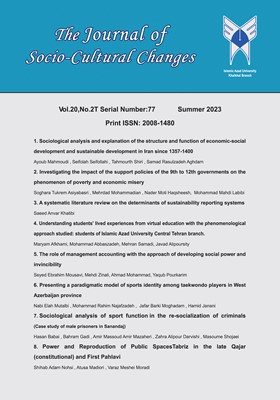Understanding students' lived experiences from virtual education with the phenomenological approach studied: students of Islamic Azad University, Central Tehran branch.
Subject Areas : Social issues of Iran
maryam afkhami
1
,
mohammad abbaszadeh
2
,
mehran samadi
3
,
javad alipur
4
![]()
1 - Department of Social Sciences Branch Islamic Azad University Tabriz Iran.
2 - Professor, Department of Social Sciences, Tabriz University, Tabriz, Iran.
3 - Assistant Professor, Department of Communication Sciences, Tabriz Branch, Islamic Azad University, Tabriz, Iran.
4 - Assistant Professor, Political Science Department, Tabriz University, Iran.
Keywords: challenges, phenomenology, virtual education, Lived experience, electronic assessment,
Abstract :
The present study seeks to investigate and understand the lived experiences of students of central Tehran Islamic Azad University of virtual education with a phenomenological approach. Purposive sampling and data collection tools, semi-structured in-depth individual interviews during which the participants were asked about the lived experience of virtual education, the interview process continued until the saturation stage, information was obtained from the interview. Virtual education related to family, costs, lack of concentration environment, family companionship, family discomfort, virtual education experiences related to professors and university, more interaction with professors, possibility of using recorded classes, lack of trust of professors and university in virtual education ,Experiences of virtual education related to the Internet and class connection tools, technical problems, experiences of virtual education related to the virtual system, gradually accompanying it, lack of providing a training booklet from the university, lack of support response, experiences of virtual education related to virtual exams, closure Exam due to technical and infrastructural problems, the difficulty of the exams compared to face-to-face exams, practicality and analytical of exams Persistence of questions in memory, Research suggestions include providing a suitable context for further interaction Adding teaching quality, increasing the quality of teaching, time and cost management Continuous evaluation of systems quality, Allocation of the Internet to students and professors, Holding virtual and face-to-face classes, Student participation through presentations or Q&A in class.
_||_


